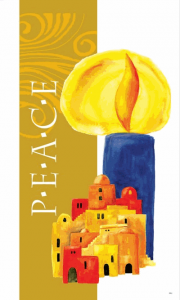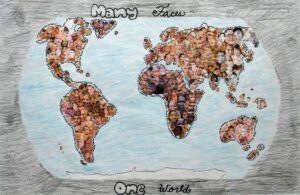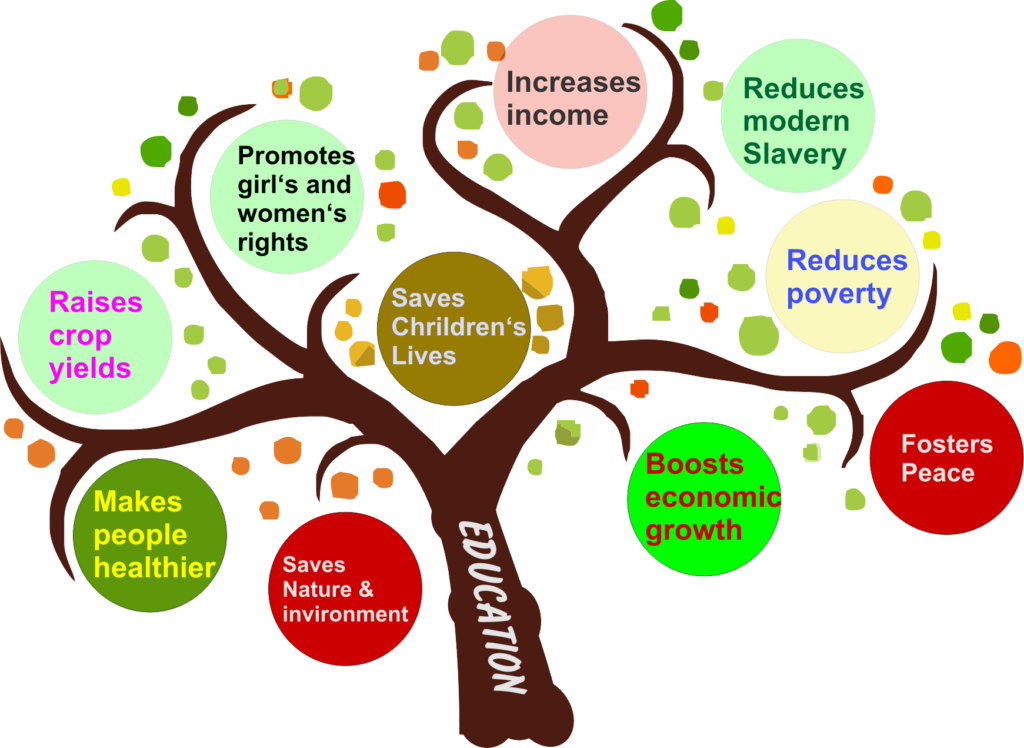
| Tekst in het Spaans | Tekst op Deutsch |

Thoughts to the first Sunday of Advent
Our world is full of small and large armed conflicts that cost thousands of people their lives or their physical and mental integrity. It is simply inconceivable that we humans learn nothing from our history.
In verbinding met deze, je zou kunnen overwegen het vers van Mat 5,39: “Wanneer iemand valt je op je rechterwang, zet de andere om hem.”A wijsheid, welke irriteert ons onmiddellijk. Waarom moet ik de pijn lijden tweemaal en raken vernederd om vrede te krijgen? – Niet weinigen zullen vragen wat is dat goed is voor. Het is niet anders dan een wijsheid die de oude Grieken al had herkend, namelijk amnestie. There it was prescribed by law and executed in all its consequences. Wat betekent dat?
Wat is er gebeurd kan niet ongedaan worden gemaakt, en we weten allemaal dat dit van vaak pijnlijke ervarings. De oproep en wraakzucht, retribution, en (vermeend) rechtvaardigheid is sterk. Maar hoe kun je slagen te ontsnappen deze spiraal van mishandeling, moord, manslaughter, and ongoing mutual violence? It is a dilemma that has plagued human history for thousands of years and we see the best example of this in the events in the Middle East. War and suffering only lead to new war and suffering.
In het oude Griekenland, werd erkend dat een nieuw, untouched page must be opened in the Book of Life. Echter, dit kan alleen gebeuren als de oude “het beledigen en kwetsen” do not continue to burden. daarom “algemene vergeten” – de amnestie, werd door de wet voorgeschreven. De schending of negeren van deze wet werd gemaakt op straffe van de dood of synoniem uitsluiting uit de maatschappij (outlaw = liet voor zichzelf zorgen), de hoogste van alle boetes. Dus, amnestie kan worden gezien als een soort prescriptieve vergeten. Dit vraagt enorm veel moed van mensen in termen van grootte en tolerantie. Dit is vaak niet gemakkelijk. Maar alleen door deze pijn een nieuw begin succeed, en een nieuwe, common life possible.
Het christelijk geloof ziet zichzelf als een religie van de vrede. Maar wat een contradictie doen we zien en lezen in het dagelijks nieuws?
Vandaag vieren we de eerste zondag van de Advent. Dit zou moeten herinneren de intocht van Jezus in Jeruzalem. (Luke 21,25-28.34-36). Dit verslag over deze triomfantelijke intocht is een contrast programma. Maar deze contrasten laten ons voorbeelden voor gebruik in het eigen leven. Het is het verhaal van een koning die komt als een lage bediende op een ezel, niet in koninklijke gewaden, maar in de kleren van de armen en de nederige. Jesus Christ does not come as an earthly king to conquer by force but with love, genade, mercy, and sacrifice for his people. Zijn koninkrijk op aarde heeft geen legers, rijkdom, of pracht, maar nederigheid en dienstbaarheid. Hij heeft geen landen veroveren of markten; hij wil niet iedereen te domineren. Nee, nodigt hij en spreekt tot de harten van de mensen, Zijn boodschap is dat van de vrede.
Elke vrede begint altijd op kleine schaal, in onszelf, ongeacht de externe omstandigheden kunnen zijn. Elke vrede begint of eindigt waar de grenzen tussen mij en mijn buurman zijn gekruist. Als er onenigheid in onszelf, Het weerspiegelt meestal naar buiten in onze woorden en daden. Vroeger of later, innerlijke “oorlog” leidt tot externe twist. That’s why it’s so important to be at peace with yourself, “to function smoothly”. ik kan niet vragen om iets van anderen die ik ben niet bereid op te geven van mezelf.
De essentiële stap op weg naar innerlijke vrede is vergeving. Alleen door anderen te vergeven en zichzelf kunnen de negatieve emoties worden overwonnen. Dit wil niet zeggen dat de handelingen of incidenten waren goed. Soms is alleen de voorgeschreven vergeten helpt hier. Dan wordt het duidelijk, wat Jezus had bedoeld met, “Wanneer iemand valt je op je rechterwang, zet de andere om hem ook.” Dit kan niet werken zonder pijn. Het is een zware strijd, maar het werkt als beide partijen hebben een oprechte interesse in deze. Vrede begint in kleine stappen en gebaren. Super goed inlevingsvermogen en creativiteit zijn die nodig zijn om conflicten op te lossen, net zoals anders, niet-gewelddadige methoden. Het is een lang leerproces en vereist emotionele volwassenheid. Laten we op weg samen op de weg naar een gemeenschappelijke vrede op deze eerste zondag van de Advent …
In deze betekenis:
Shalom aleikhem - de zout-eenhis'Alaykum -
vrede zij met u -
Vrede zij met u –
Vrede met u –
Vrede zij met u –
vrede zij met u –
Vrede zij met u ...!
Time for conversion
from abundance to the necessary
from exaggeration to frugality
from wanting to be satisfied
from addiction to freedom
Time for conversion
from hypocrisy to sincerity
from narrow-mindedness to broad-mindedness
from self-righteousness to goodness
from arbitrariness to clarity
from fickleness to faithfulness
Time for conversion
from the I to the Thou
from alienation to closeness
from indifference to sympathy
from grievance to reconciliation
from hostility to peace
Time for conversion
from noise to silence
from hectic to pause
from impatience to serenity
from distraction to composure
from the surface to the essential

Tiempo de conversión
de la abundancia a lo necesario
de la exageración a la frugalidad
del deseo de tener a la satisfacción
de la adicción a la libertad
Tiempo de conversión
de la hipocresía a la sinceridad
de la estrechez de miras a la amplitud
del fariseísmo a la bondad
de la arbitrariedad a la claridad
de la inconstancia a la fidelidad
Tiempo de conversión
del yo al tú
del distanciamiento a la cercanía
de la indiferencia a la simpatía
del agravio a la reconciliación
de la hostilidad a la paz
Tiempo de conversión
del ruido al silencio
de la agitación a la pausa
de la impaciencia a la serenidad
de la distracción a la serenidad
de lo superficial a lo esencial

There are many different approaches to Salvatorian Universality. While the sisters and brothers of the religious communities see in it more the all-embracing love of God that is given to every human being without exception, we Lay Salvatorians seek a more practical application of it. For it is a truly universal instrument to give and make our neighbor experience the love of God.
As mentioned before, one of our most important guiding principles is the words of Blessed Francis Jordan: “As long as there is one person on earth who does not know God and does not love God above all things, you dare not allow yourself a moment’s rest.” Lees verder
 Even if there are local Salvatorian communities in several countries of the world, we must now find a common path to the future. We are now a Private Association of the Faithful dotted with juridical personality recognized by the dicastery of laity, familie, and life at the Vatican. This indicates leaving some fond and cherished practices and taking over and becoming familiar with some new ones. In particular, we need to pay more attention to becoming a true community.
Even if there are local Salvatorian communities in several countries of the world, we must now find a common path to the future. We are now a Private Association of the Faithful dotted with juridical personality recognized by the dicastery of laity, familie, and life at the Vatican. This indicates leaving some fond and cherished practices and taking over and becoming familiar with some new ones. In particular, we need to pay more attention to becoming a true community.
ikn a true community, it’s not enough to meet on a superficial conversational level, make a little more than small talk, and leave out all the areas that really get to the heart of a person and bring us closer together. True communities have passed 4 phases: Lees verder
Since the Lay Salvatorians began to develop in the 70s and 80s of the last century, their image has changed a lot. While the first Lay Salvatorians were dropouts from the two Salvatorian religious communities, real lay people have increasingly built up the present communities. And with that, a somewhat different spirit or outlook came to light. Equal in spiritual content but differently expressed by life.
In the following I want to draw an image of Lay Salvatorians today now and how the development could go forward into the future.
 The world we live in has a lot of different faces and with it a lot of different life issues and challenges. Living our Christian Catholic faith is not easy in many places and is becoming increasingly difficult even in those areas where it was previously considered traditional. The reasons for this are diverse and very much go hand in hand with changes in our values and points of view of society. Lees verder
The world we live in has a lot of different faces and with it a lot of different life issues and challenges. Living our Christian Catholic faith is not easy in many places and is becoming increasingly difficult even in those areas where it was previously considered traditional. The reasons for this are diverse and very much go hand in hand with changes in our values and points of view of society. Lees verder

In today’s increasingly globalized world, where challenges must be addressed locally and globally at the same time, basic and comprehensive education is inevitable. Even if some people will not like going back to school, our world and life today afford lifelong learning everywhere. It is a slogan but if you think about it more closely at all times it was necessary to face new challenges and experiences and analyze them. Without doing so nobody would have been able to survive at any time. Today of course in a globalized world the amount of information is enormous and increasing. But to be interested in multifaceted topics can only marginally be compared with going to school again. Lees verder